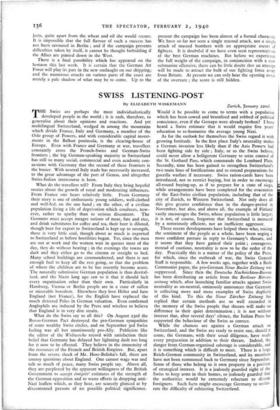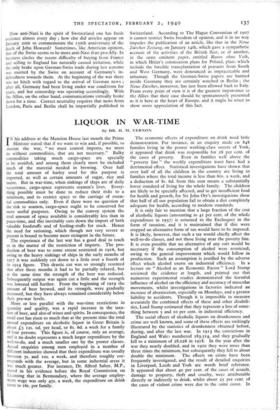SWISS LISTENING-POST
By ELIZABET
THE Swiss are perhaps the most individuahstically developed people in the world ; it is rash, therefore, to generalise about their opinions and reactions. And yet multilingual Switzerland, wedged in among the mountains which divide France, Italy and Germany, a member of the Oslo group of Powers, and with considerable capital invest- ments in the Balkan peninsula, is the clearing-house of Europe. Even with France and Germany at war, travellers constantly cross the French-Swiss and German-Swiss frontiers ; the big German-speaking majority in Switzerland has still so many social, commercial and even academic con- nexions with Germany that the second of these frontiers is the busier. With neutral Italy trade has necessarily increased, to the great advantage of the port of Genoa, and altogether Swiss-Italian intercourse is keen.
What do the travellers tell? From Italy they bring hopeful stories about the growth of royal and moderating influences. From France one hears relatively little. From Germany their story is one of enthusiastic young soldiers, well-clothed and well-fed, on the one hand ; on the other, of a civilian population living a life of deprivation which conduces, how- ever, rather to apathy than to serious discontent. The Germans must accept meagre rations of meat, fats and rice, and drink substitutes for coffee and tea, their beer is diluted, though beer for export to Switzerland is kept up to strength, there is very little coal, though about as much is exported to Switzerland as before hostilities began. Yet, since the men are out at work and the women wait in queues most of the day, they do without heating ; in the evenings the towns are dark and they either go to the cinema or straight to bed. Many school buildings are commandeered, and there is not enough fuel to keep all the rest going, so that the problem of where the children are to be has recently become acute. The naturally submissive German population is thus devital- ised, and the Nazis long ago saw to it that it should lack every organisation other than their own. Particularly in Hamburg, Vienna or Berlin people are in a state of sullen or miserable boredom. Elsewhere they love Hitler and hate England (not France), for the English have replaced the much detested Poles in German valuation. Even confirmed Anglophils are induced by the Press and wireless to believe that England is in very dire straits.
What do the Swiss say to all this? On August 23rd the Russo-German Pact destroyed the pro-German sympathies of some wealthy Swiss circles, and on September 3rd Swiss feeling was all but unanimously pro-Ally. Publicists like the editor of the Weltwoche record with satisfaction their belief that Germany has delayed her lightning dash too long for it now to be effected. They believe in the immensity of the resources of the French and British Empires. But, apart from the severe shock of Mr. Hore-Belisha's fall, there are uneasy questions about England. One cannot wage war and talk so much of peace, many Swiss people say. Above all, they are perplexed by the apparent willingness of the British Government to accept émigrés' estimates of the strength of the German opposition and to waste efforts in dropping anti- Nazi leaflets which, as they hear, are scarcely glanced at by discontented persons of no possible political significance. Would it be possible to come to terms with a population which has been cowed and brutalised and robbed of political conscience, even if the Gestapo were already broken? I have heard a Swiss estimate that it would require five years' education to re-humanise the average young Nazi.
As for the outlook for themselves the Swiss regard it with growing fortitude. In the first place Italy's neutrality makes a German invasion less likely than if the Axis Powers had been fighting side by side ; Italy, or so the Swiss believe, could never allow a belligerent Germany to seize control of the St. Gothard Pass, which commands the Lombard Plain.
Secondly, tune has been gained to strengthen Switzerland's two main lines of fortifications and to extend preparations for guerilla warfare if necessary. Swiss ration-cards have been introduced, not to restrict buying, but in order to encourage all-round buying-up, as if to prepare for a state of siege, while arrangements have been completed for the evacuation of the East-Swiss civilian population, including that of the city of Zurich, to Western Switzerland. Not only does all this give greater confidence than in the danger-period in November, but also, and above all, the example of Finland vastly encourages the Swiss, whose population is little larger: it is not, of course, forgotten that Switzerland is menaced by a notoriously efficient, not an inefficient aggressor.
These recent developments have helped those who, voicing the sentiment of the people as a whole, have been urging a more confident posture in reply to Germany's threats, and it seems that they have gained their point ; courageous, instead of cautious, neutrality is now to be the order of the day. Practically this is a matter of the policy of the Press, for which, since the outbreak of war, the Swiss General Staff is responsible. A few weeks ago, together with a Basle Communist paper, the pro-German Neue Basler Zeitung was suppressed. Since then the Deutsche Nachrichten-Bureau has been distributing an article from the Berliner Biirsen- zeitung which, after launching familiar attacks against Swiss neutrality as un-neutral, ominously announces that Germany is collecting more and more examples of Swiss duplicity of this kind. To this the Neue Ziircher Zeitung has replied that certain methods are so well recorded in the memory of the Swiss people that threats will make no difference to their quiet determination ; it is not without interest that, after several days' silence, the Italian Press has supported the behaviour of the Swiss as correct.
While the chances are against a German attack on Switzerland, and the Swiss are ready to resist one, should it come, the Germans, with their usual diligence, have made every preparation in addition to their threats. Indeed, the danger from German-organised sabotage is considerable, and it is something which is difficult to meet. There is a large Reich-German community in Switzerland, and its members have not been summoned back to Germany since September. Some of those who belong to it own property in a position of strategical interest. It is a jealously guarded right of the Swiss to keep arms in their homes, so jealously guarded that the authorities would be extremely reluctant to disarm foreigners. Such facts might encourage Germany to under- rate the difficulty of subjecting Switzerland. How anti-Nazi is the spirit of Switzerland one has fresh evidence almost every day ; how else did articles appear on January 20th to commemorate the isoth anniversary of the death of John Howard? Sometimes, like American opinion, that of the Swiss seems to be more anti-Nazi than pro-Ally. In business circles the recent difficulty of buying from France and selling to England has naturally caused irritation, while the only brake upon German-Swiss trade during last autumn was exerted by the Swiss on account of Germany's in- debtedness towards them. At the beginning of the war there was no hitch with regard to the arrival of German news ; after all, Germany had been living under war conditions for years, and her censorship was operating accordingly. With the Allies, on the other hand, communications virtually broke down for a time. Correct neutrality requires that news from London, Paris and Berlin shall be impartially published in Switzerland. According to The Hague Convention of 1907 it cannot restrict Swiss freedom of opinion, and it in no way impedes the publication of an article, like that in the Neue Ziircher Zeitung, on January i4th, which gave a sympathetic account of the activities of the British fleet, or of another, in the same eminent paper, entitled Raum ohne Volk, in which Hitler's colonisation plans for Poland, plans which include the forcible transplantation of peasants from South and West Germany, were denounced as impracticable and inhuman. Though the German-Swiss papers are banned inside Germany they are certainly watched in Berlin ; the Neue Ziircher, moreover, has just been allowed back to Italy. From every point of view it is of the greatest importance r.o the Allies that their case should be spontaneously presented as it is here at the heart of Europe, and it might be wiser to show more appreciation of this fact.







































 Previous page
Previous page